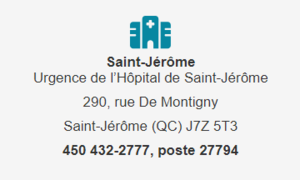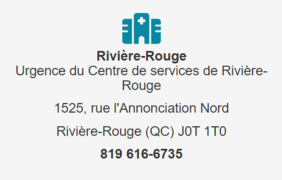Designated centres
Designated centres for medical and social intervention for victims of sexual assault
The CISSS des Laurentides has two designated centres for medical and social intervention for victims of sexual assault:
A designated centre for medical and social intervention for victims of sexual assault provides various emergency medical and psychosocial services for all victims of sexual assault occurring within the past six months, regardless of age or gender. The six-month deadline does not apply to victimized minors, which means that they can consult a designated centre more than six months after a sexual assault.
The services of designated centres are available 24 hours a day, 7 days a week, and are provided by a medical and psychosocial team made up of counsellors, nurses and doctors; all trained to help victims of sexual assault.
Adult victims whose last sexual assault occurred more than six months ago should call Info-Social or the Sexual Violence Helpline to be directed to an appropriate assistance organization. See the Resource Directory for more information.
Sexual Violence Helpline: 1-888-933-9007
Info-Social: 811, option 2
Medical follow-up after a visit to a designated centre for medical and social intervention for victims of sexual assault.
During a medico-social intervention at a designated centre, a victim is given a great amount of information. The ability to remember this information in a stressful situation is limited.
To ensure that the information about medical follow-up provided is easily accessible to victims who visited the Saint-Jérôme designated centre, here's what you need to know about the medical follow-up for adult victims provided systematically by the médecine de jour (day care medecine) department:
- Before the first appointment: You will be called 48 to 72 hours after your visit to the designated centre to make a first in-person appointment with the microbiologist. If you do not answer the first call, a maximum of three further attempts to contact you will be made at various times. No letter will be sent to you if we are unable to contact you during these three additional attempts.
- During your first appointment: The nurse from the day care medecine departement will conduct a brief assessment of your health before you meet the microbiologist who will then follow up on your test results for sexually transmitted and blood-borne illnesses (STBBIs) and will prescribe an appropriate treatment plan. You may be offered an assessment of your physical condition, but you can always refuse it. Based on the availability of doctors, you can ask that your physical examination be conducted by a female, and you have the right to be accompanied by a loved one. Before you leave, you will be given documentation about your medication and dates will be set for the next two telephone follow-ups.
- After the first appointment: Telephone follow-up will be conducted three months after your visit to the designated centre and a last one will take place after six months.
We recommend that you participate in the proposed medical follow-up because it will test for STBBIs and assess your overall health. If you have an STBBI, appropriate treatment will be prescribed.
You can contact the day care medecine team by calling 450-431-8640 Monday to Friday from 8:00 a.m. to 4:00 p.m.
Referral to sexually transmitted and blood-borne illness (STBBI) testing centres for victims of sexual assault
Victims of sexual assault who have been to the designated centre in Saint-Jérôme and want to have medical follow-up in an STBBI testing clinic near their home can now have access to one if they meet certain criteria:
- The victim is age 14 and up.
- The victim has no other medical need apart from follow-up screening for STBBIs.
- The victim accepts to go in person for first assessment at the day care medecine departement of the Hôpital de Saint-Jérôme to confirm their admissibility for continuing their medical follow-up at an STBBI testing clinic.
For the moment, victims who go to the designated centre in Rivière-Rouge are not able to benefit from follow-up in STBBI testing clinics.
To consult the list of STBBI testing clinics in the Laurentians: Sexually transmitted and blood-borne illness (STBBI) and contraception clinics (in French only).
Frequently asked questions (FAQ)
1. How can a victim initiate or activate a medico-social intervention at a designated centre?
The victim can go to triage at the emergency room and disclose having been sexually assaulted. The victim will not be questioned and will be led to a specific room to await the psychosocial worker. The victim can be alone or accompanied.
The victim can also contact the chosen designated centre at the above numbers and say that they are coming so that the medico-social intervention can be initiated.
If the victim’s disclosure occurs while receiving services from the CISSS des Laurentides, an educational services centre, a community organization or a police department, that partner can obtain the victim’s consent to directly advise the designated centre of the victim’s arrival.
2. How does a victim prepare for the medico-social intervention at the designated centre?
Although the following conditions are recommended before going to the designated centre, victims are accepted even if they don’t follow them.
- Bring their health insurance card or any other health insurance document.
- Avoid washing.
- Avoid using the toilet.
- Avoid eating or drinking.
- Avoid taking psychotropic medication unless it is in regular prescribed use.
- Avoid washing clothes that were worn during the sexual assault and bring them to the designated centre.
Source: Services | Designated centres | Advisory services
3. What steps are taken during a medico-social intervention in a designated centre?
- Step 1: Registration and emotional support
Once the victim arrives at the designated centre, they will be accompanied by a counsellor who will provide them with support throughout their time in the designated centre. The victim will also be able to talk and express their feelings in a safe environment. - Step 2: Focus of the intervention
The victim will decide with the counsellor, along with the nurse and doctor, which kit will be used during the intervention. The victim can choose between the medico-social kit and the forensic kit.
Both types of kit involve the completion of forensic forms placed in the victim’s medical file at the end of the intervention. One copy of these forms will be sent to the police department if the victim decides to file a complaint. Forensic samples such as urine, blood, vaginal swab, anal swab, skin swab or mouth rinse are part of the forensic kit which is accompanied by a sealed box in which these samples are placed. The medico-social kit contains only forensic forms and no box is included. - Step 3: Medical and social history
The counsellor will assess the victim’s needs based on their account, and, with the help of the nurse, will determine the samples required. This information will be recorded on a form. - Step 4: Medical examination, medico-social or forensic kit, tests and samples The medical examination is always conducted by a doctor (female or male). The counsellor and a nurse can sometimes be there, based on the victim’s needs and the context. This examination can be conducted whether or not the victim decides to file a complaint. It consists of:
- Checking the victim’s overall state of health.
- Treating their injuries and wounds.
- Testing for sexually transmitted or blood-borne illnesses (STBBIs).
- Preventing an unwanted pregnancy.
- Taking samples (only for the forensic kit).
- Step 5: Care and treatment
This step includes prevention of pregnancy or STBBIs, treatment of wounds and STBBIs, and prescriptions for medications when necessary. - Step 6: Information and support, DYP report, police statement and referrals
This step includes, based on circumstances:- Reporting to the DYP.
- Accompaniment when making the police statement (optional).
- Making medical and psychosocial follow-up appointments.
- Provision of supporting documents to explain absence from work or school.
- Provision of a medical certificate for access to compensation for victims of crime (IVAC).
- Provision of contact information for community organizations providing assistance to victims of sexual assault, including organizations that assist victims of sexual assault (CALACS), help centres for victims of crime (CAVAC), shelters for victims of domestic violence, etc.
- Step 7: Medical follow-up
About 48 to 72 hours following the victim’s visit to the designated centre, a medical team will follow up to assess their overall state of health, detect a pregnancy or screen for and treat STBBIs. - Step 8: Psychosocial follow-up
CAVAC offers, on a voluntary basis, psychosocial follow-up to victims in the weeks following their visit to the designated centre to help them deal with their reactions and the possible after-effects of the sexual assault (e.g.: nightmares, fear, insomnia, fatigue, anxiety, etc.). The psychosocial follow-up can also inform the victim of the social and legal details regarding the complaint process.
Based on the victim’s needs, an occasional telephone reminder can be organized by the counsellor who conducts the medico-social intervention with the victim in the days following their visit to the designated centre. The objective of this reminder can vary. For example, it can be to re-evaluate the victim’s state, ensure their safety, direct them to appropriate resources or make a formal referral to a specific service. It is different from psychosocial follow-up because it is occasional.
Source: Services | Designated centres | Advisory services
4. Do medico-social interventions in designated centres take place only in hospital emergency rooms?
At the CISSS des Laurentides, the current intervention model is provided only in the ER in order to centralize the services received by victims and to simplify the medico-social intervention process.
5. Does a medico-social intervention in a designated centre require a complaint?
It is entirely up to the victim to choose whether to file a complaint with the police or not. However, once a complaint has been filed or a situation reported to the police, the decision to prosecute the suspect may be taken out of the victim's hands. In criminal proceedings, it is up to the criminal and penal prosecuting attorney to decide whether charges will be brought by the State.
Source: Deciding whether to charge a suspect with a crime: the prosecutor’s role
Questionnaire about the care and services received in the hospital
- You have received care and services at one of the designated centres?
- You wish to help us improve the services offered at our designated centres?
We invite you to fill out the following survey. It is confidential, and will take approximately five minutes to complete.
You wish to get involve as a Patient Partners resource (UPR), check our Care and services partnership (in French only) webpage.

